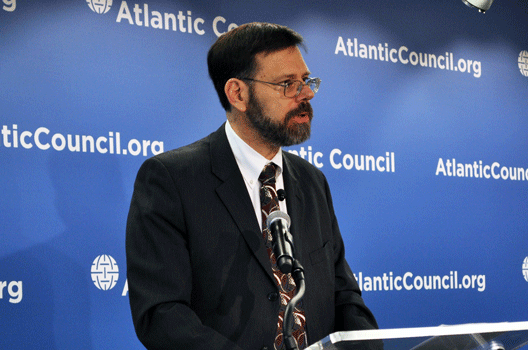 Major geopolitical players such as China, India, the United States, and the European Union have committed to cut emissions, but it is equally important to mobilize private sector investment in this effort, Jonathan Pershing, the US special envoy for climate change, said at the Atlantic Council on October 25.
Major geopolitical players such as China, India, the United States, and the European Union have committed to cut emissions, but it is equally important to mobilize private sector investment in this effort, Jonathan Pershing, the US special envoy for climate change, said at the Atlantic Council on October 25.
“Climate change is a problem that actually does have solutions,” Pershing said, but these solutions require collaboration across borders.
“Driven by this threat, the global community is beginning to rise to the challenge,” he added.
However, emission-reduction efforts reflect only one part of the agenda agreed to in Paris in December of 2015, according to Pershing. The other half relies on mobilizing climate finance.
“The International Energy Agency estimated that the climate pledges made to date and announced in the lead up to Paris would yield a $7.4 trillion global investment in renewable energy in the next two decades,” he said. Pershing stressed the need to incentivize greater private sector investment.
On October 5, the European Parliament ratified the Paris agreement, a deal which can only enter into force when fifty-five countries representing 55 percent of the world’s greenhouse gas emissions commit to emission reduction efforts. The European Parliament’s decision to ratify the agreement passed the threshold for the deal to enter into force, which will happen on November 4.
From November 7-18, signatories of the Paris agreement will convene at the twenty-second conference of the parties (COP22) in Marrakech, Morocco. Pershing will represent the United States at the conference and help set the agenda to implement the goals pledged in Paris.
Pershing delivered a keynote address at the Atlantic Council where he discussed US climate policy after Paris and the importance of global commitment to addressing the challenge posed by climate change.
“With the Paris agreement in place, we now have an opportunity to marshal our collective will to do something, and do it now,” Pershing said. He added, “it’s a call to action that the world needs to heed.” Coral Davenport, a correspondent with the New York Times, moderated a subsequent discussion.
Pershing described how “climate’s getting worse at about the same rate that our policies are getting better” and that this increased risk has brought increased commitment and a “huge shift in politics at the global level.”
Though there is a renewed sense of urgency within the international community to address climate change, the pledges set forth in Paris alone are insufficient. “For a deal to work, parties had to have confidence that others would meet these national commitments” to cut emissions, Pershing said. The system established in Paris has layers of accountability and measurement mechanisms to keep countries to task. “We do not want any backsliding,” Pershing said.
While there is no external regulatory body to enforce the nationally-determined contributions (NDCs) to reduce greenhouse gas emissions pledged in Paris, Pershing was confident that countries will act of their own accord. He said, “what we’ve got instead is a structure which relies on national limitation.”
Many of the countries that made pledges in Paris have passed laws to promote compliance with the agreement. In the United States, Congress has passed legislation that supports renewable energy. Pershing said that “all of these initiatives represent an unprecedented, whole-of-government approach to addressing climate change, and the effects are already apparent.” Punishments for breaking with the policies will be imposed by domestic governments, not the international community, he added.
Major emitters such as Russia and Saudi Arabia have a particularly important role to play, as both countries’ economies depend on fossil fuels, Davenport said. She noted that Russia, a nation that depends on oil revenue, is openly skeptical of the science of climate change. However, Pershing said that “it’s not so much that [Russia] is stopping things, it’s just not engaging.”
Ultimately, Pershing said, Russia’s export markets will play a role in shaping the energy infrastructures. While the future of Russian engagement with climate change remains uncertain, “the future of Russian leadership, whether [Russian President Vladimir] Putin or someone else, is going to have to manage this.”
In contrast, Saudi Arabia is seeking alternatives because it sees renewable energy as a market for new jobs, Pershing said. In addition, the region is directly threatened by climate change.
Climate change plays a significant role in natural disasters and changing conditions around the world. Considering issues like superstorms, which threaten urban infrastructure, the spread of the Zika virus, and drought that has driven Nigerian farmers out of work and into the fold of the terrorist group Boko Haram, Pershing said that “while the origin of these problems can’t be laid exclusively to climate change, they’ve been made noticeably worse by climate change, and they’ll become worse still as warming continues.”
While he saw enormous opportunities presented by the Paris agreement, Pershing said that achieving policies requires a collective set of actors, and that is difficult. The shift toward clean energy depends on sustainable, durable changes, he said.
“Action comes with demonstrable upside potential, while inaction carries with it a terrible downside risk,” Pershing warned. Ultimately, he said, “the risks of failing to address climate change are actually untenable. Simply put, it’s not a choice.”
Rachel Ansley is an editorial assistant at the Atlantic Council.
Image: US Special Envoy for Climate Change Jonathan Pershing delivered a keynote address at the Atlantic Council on October 25. (Atlantic Council)
